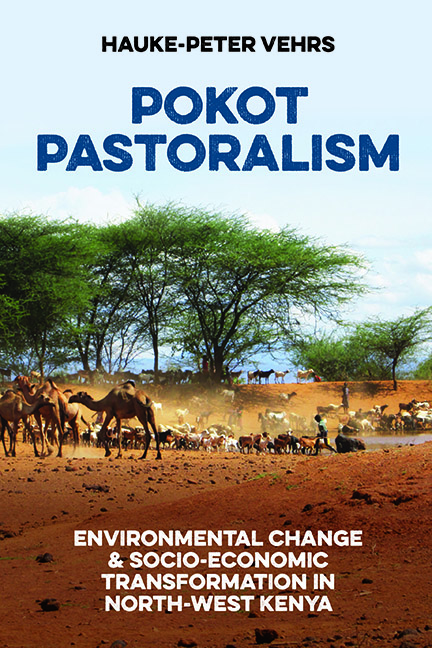Book contents
- Frontmatter
- Dedication
- Contents
- List of Illustrations
- Preface and Acknowledgements
- List of Abbreviations
- 1 Introduction
- 2 East Pokot: A Place and its People
- 3 Pokot Pastoral Livelihoods
- 4 The Paka Community
- 5 Environmental Changes in East Pokot
- 6 Socio-Ecological Transformations in the Agro-Pastoral Highlands
- 7 Ecological Change and Local Livelihoods: Scientific and Pokot Perspectives
- 8 Ecological Invasions: Agents of Socio-Ecological Transformation
- 9 Ecological Challenges and Social Transformations
- Appendix: Lists of Plant Names (Pokot–Scientific and Scientific–Pokot)
- Bibliography
- Index
- Future Rural Africa
1 - Introduction
Published online by Cambridge University Press: 16 July 2022
- Frontmatter
- Dedication
- Contents
- List of Illustrations
- Preface and Acknowledgements
- List of Abbreviations
- 1 Introduction
- 2 East Pokot: A Place and its People
- 3 Pokot Pastoral Livelihoods
- 4 The Paka Community
- 5 Environmental Changes in East Pokot
- 6 Socio-Ecological Transformations in the Agro-Pastoral Highlands
- 7 Ecological Change and Local Livelihoods: Scientific and Pokot Perspectives
- 8 Ecological Invasions: Agents of Socio-Ecological Transformation
- 9 Ecological Challenges and Social Transformations
- Appendix: Lists of Plant Names (Pokot–Scientific and Scientific–Pokot)
- Bibliography
- Index
- Future Rural Africa
Summary
Much has been written about pastoralism in East Africa, the challenges faced by today's pastoralists and how these groups are transforming their livelihoods and environments in order to adapt to the ever more rapid changes. Kenya is home to many pastoral groups, most of which are in a state of change or have been exploring new forms of livelihood and income strategies off the beaten track of pastoral subsistence in recent decades. The most prominent example is the Maasai who live in both Kenya and Tanzania, and the changing lives of various Maasai groups are well documented (see for instance Hodgson, 2011; Homewood, 2008; Jandreau & Berkes, 2016; McCabe et al., 2014; Spear & Waller, 1993). The consequences of these changes for the groups themselves, as well as the environment in which they live, are not easy to assess. Besides the ecological changes and the resulting impacts on the pastoral economy, it is especially the social organisation of these groups that is transforming, either out of the necessity to respond to the environmental changes or due to emerging possibilities of generating cash income. What all these groups in East Africa, perhaps even worldwide, have in common is the increasing external influences on their livelihood systems.
On the one hand, they face the major challenge of having to deal with environmental change, especially against the background of climate change and in light of the novel character of rapid changes, such as ecological invasions, that occur over a relatively short period of time. The questions arise as to how these often marginalised groups can respond to such changes and also be integrated into the national context both politically and economically, but also how this process of integration of pastoral regions takes place and how this, in turn, affects pastoral livelihoods.
I seek to contribute to answering these questions by describing the history of human–environment relations in a specific group of pastoral people, and thereby going beyond the accounts of the prominent pastoral groups and the stereotyped representation of these in the media. Apart from the famous Maasai and Samburu pastoralists in Kenya and Tanzania, there are many other pastoral groups in East Africa that are facing tremendous changes on different temporal and spatial scales.
- Type
- Chapter
- Information
- Pokot PastoralismEnvironmental Change and Socio-Economic Transformation in North-West Kenya, pp. 1 - 13Publisher: Boydell & BrewerPrint publication year: 2022

